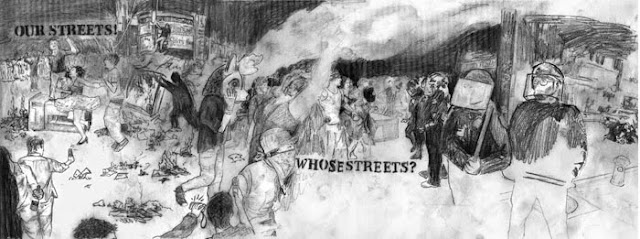(Editor's Note: This piece was written in collaboration with members of the Fee Strike Working Group and the Education Crisis Research Group.)
To many, the recent "riots" near Berkeley's campus seem ill-timed at best, and reprehensible at worst, even among ostensible supporters of the movement. We should not, however, allow fallout from this incident to distract us from the March 4 mobilizations occurring across 18 states. Whether the events of Feb. 26 hurt us or help us is beside the point. The movement to save the tatters of public education that remain in California and to defend democratic educational institutions has always contained a range of political opinions. Its diversity, in fact, is its greatest strength.
And so, drawing strength from our diversity, we mobilize for March 4, despite the administration's attempts to demonize the "rioters." More homogenous groups, pressing for "achievable" goals by patiently and carefully issuing demands rarely see them met by policy-makers with a stake in preserving business as usual. Successful movements have always been a collaborative and messy process between groups, individuals, factions and fractions who rarely agree. Tension produces dialogue-total agreement is neither realistic nor desirable. Regardless of how we differ on tactics, strategy, and ethics-in a word, politics-we share a fundamental
opposition to how the crisis of public education in California has been framed and acted upon by those in power.
If you read the paper Friday morning, you might have experienced a feeling of distance from those who took to the streets the night before. We encourage you to fight the urge to give up, the urge to walk away, or worse yet, the urge to police one another because of disagreement over tactics. There is always uncertainty surrounding tactical effectiveness. But there is absolute certainty about the consequences of disengagement from the movement.
The March 4 mobilizations will not stand or fall on whether we all agree. They will stand or fall on whether our numbers convey the grave urgency of the status of public education in California and the broken budgeting process which harms all Californians. While the powerful wring their hands, shed crocodile tears and say, "there is no alternative," we must insist. We've heard this excuse before, and we're still not falling for it.
On March 4, some of us will march to the seat of obstructionism in Sacramento, where cuts to the vulnerable are the answer to every fiscal question. Some of us will march on campuses in the East Bay and in San Francisco, showing that whatever happens in Sacramento, business as usual here at home cannot continue. Some of us have already taken action, seizing buildings and spaces on and off campus, in carnivals of insurrection. And some of us have supported our fellows even when we disagreed with their tactics, defending ourselves against police batons and paying for it in blood, bruises and broken bones. We all oppose those who have partnered with corporate capital against the students, workers and families of California. We are unafraid of the specter of guilt by association. Our spectrum of engagement keeps us growing. Attempts to slow us down, divide us, or trick us into

